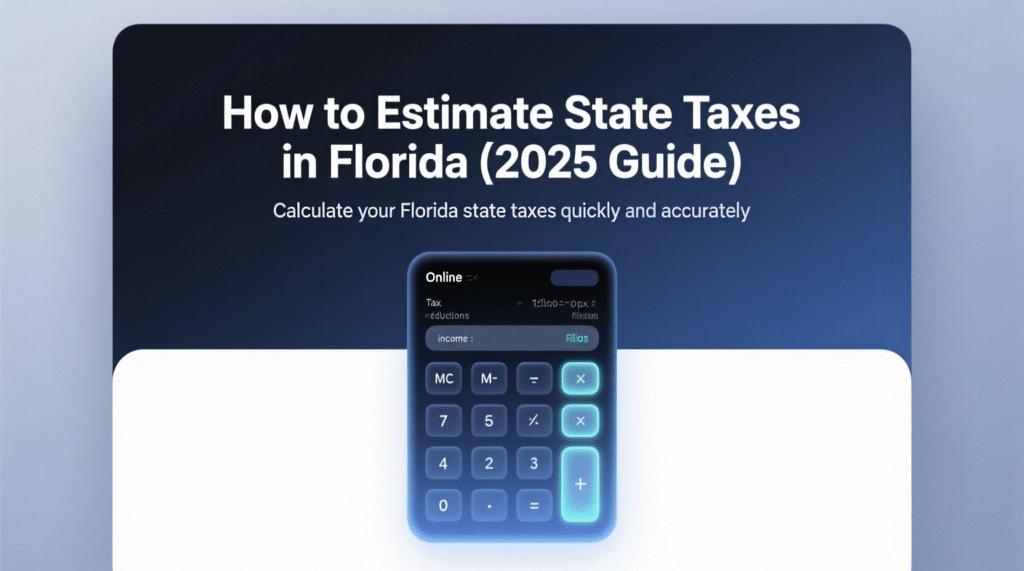
If you live or work in Florida, you’ve probably wondered: “How do I figure out my state tax bill?” The short answer is simple — Florida does not have a state income tax. That means your paycheck isn’t reduced by state withholding like it would be in New York, California, or New Jersey.
But no income tax doesn’t mean no taxes at all. To truly estimate your Florida state tax burden, you need to look at sales taxes, property taxes, and a few local extras. Here’s how to break it down step by step.
1. Know the Basics: Florida Has No State Income Tax
Florida is one of just nine states with no personal income tax. That means your wages, salary, bonuses, or retirement distributions aren’t taxed at the state level.
This is a huge financial benefit, especially for high earners and retirees. It’s also why many people move from states like New York or Illinois to Florida.
Key takeaway: Your paycheck will only have federal income tax, Social Security, and Medicare withheld — not Florida state income tax.
2. What State Taxes You Still Pay in Florida
Even without an income tax, Florida collects revenue in other ways. To estimate your total state taxes, focus on:
- Sales & Use Tax
- Florida’s base sales tax is 6%.
- Counties can add a surtax (0.5%–2.5%), so your combined rate could reach 7.5–8.5%.
- A “use tax” applies if you buy items out of state or online and don’t pay Florida sales tax at checkout.
- Property Tax
- Average effective property tax rate: 0.74–0.89% of assessed value.
- Homeowners can reduce this with the homestead exemption (up to $50,000) and the Save Our Homes cap, which limits annual increases in assessed value.
- Excise Taxes
- Gasoline, alcohol, and tobacco have separate state taxes.
- Vehicle registration fees typically run $27–$45 per year.
- Tourism & Local Taxes
- Short-term rentals, hotels, and car rentals often carry additional local levies.
3. Step-by-Step: Estimating Your Florida State Taxes
Here’s a simple way to run your own estimate:
A. Estimate Sales Tax
- Add up your yearly spending on taxable goods (clothing, dining out, electronics).
- Multiply by your county’s combined sales tax rate.
- Example: $20,000 in spending × 7% = $1,400 in sales tax.
(Tip: Florida’s Department of Revenue lists current county surtaxes.)
B. Estimate Property Tax
- Find your county’s property tax rate and your home’s assessed value.
- Apply exemptions (like homestead).
- Example: Home value $300,000 – $50,000 exemption = $250,000 taxable.
- Property tax at 0.9% = $2,250/year.
C. Add Excise & Vehicle Costs
- If you drive 12,000 miles a year at 25 mpg, that’s ~480 gallons.
- With Florida’s gas tax (~34 cents/gallon), that’s about $163/year in fuel taxes.
- Add vehicle registration ($40 average).
D. Factor in Use Tax if Needed
- If you order $2,000 in furniture from an out-of-state seller and no sales tax was collected, Florida requires you to self-report and pay 6–7.5% (about $120–$150).
4. Real-Life Scenarios
| Profile | Sales Tax | Property Tax | Excise/Vehicle | Total State Taxes |
|---|---|---|---|---|
| Renter in Orlando (spends $25K taxable goods) | $1,750 | $0 | $200 | $1,950 |
| Homeowner in Miami (home $300K, spends $20K) | $1,400 | $2,250 | $200 | $3,850 |
| Retiree in Tampa (home $250K, spends $15K) | $1,050 | $1,850 | $180 | $3,080 |
This table shows how your tax burden depends more on spending and property ownership than on income — very different from high-tax states.
5. FAQs About Florida State Taxes
Do Floridians pay state income tax?
No. Florida does not tax personal income.
What is the sales tax in Florida?
6% statewide, plus up to 2.5% county surtax.
How high are property taxes in Florida?
On average, 0.74–0.89% of assessed value, lower than the U.S. average.
What’s the homestead exemption?
Up to $50,000 off your home’s taxable value, plus a 3% annual cap on assessed value increases.
Do retirees pay state tax on pensions or Social Security in Florida?
No. Retirement income is not taxed at the state level.
When do I owe use tax?
If you buy online or out-of-state and weren’t charged Florida sales tax.
Robert is the creator of StateTaxesEstimator.com, a trusted resource dedicated to helping users accurately estimate their state taxes. With a strong focus on clarity and precision, Robert combines expert knowledge with practical tools to simplify complex tax calculations. His mission is to empower individuals and businesses to make informed financial decisions with confidence and ease.
